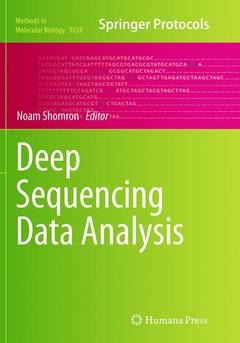Description
Deep Sequencing Data Analysis, 2013
Methods in Molecular Biology Series, Vol. 1038
Language: English
Support: Print on demand
234 p. · 17.8x25.4 cm · Hardback
Description
/li>Contents
/li>Comment
/li>
The new genetic revolution is fuelled by Deep Sequencing (or Next Generation Sequencing) apparatuses which, in essence, read billions of nucleotides per reaction. Effectively, when carefully planned, any experimental question which can be translated into reading nucleic acids can be applied.In Deep Sequencing Data Analysis, expert researchers in the field detail methods which are now commonly used to study the multi-facet deep sequencing data field. These included techniques for compressing of data generated, Chromatin Immunoprecipitation (ChIP-seq), and various approaches for the identification of sequence variants. Written in the highly successful Methods in Molecular Biology series format, chapters include introductions to their respective topics, lists of necessary materials and reagents, step-by-step, readily reproducible protocols, and key tips on troubleshooting and avoiding known pitfalls.
Authoritative and practical, Deep Sequencing Data Analysis seeks to aid scientists in the further understanding of key data analysis procedures for deep sequencing data interpretation.
An Introduction to High-throughput Sequencing Experiments: Design and Bioinformatics Analysis.- Compressing Resequencing Data with GReEn ∗.- On the Accuracy of Short Read Mapping.- Statistical Modeling of Coverage in High-Throughput Data.- Assembly Algorithms for Deep Sequencing Data: Basics and Pitfalls.- Short Reads Mapping for Exome Sequencing. Profiling Short Tandem Repeats from Short Reads.- Exome Sequencing Analysis: A Guide to Disease Variant Detection.- Identifying RNA Editing Sites in miRNAs by Deep Sequencing.- Identifying Differential Alternative Splicing Events from RNA Sequencing Data using RNASeq-MATS.- Optimizing Detection of Transcription Factor Binding Sites in ChIP-seq Experiments.- Statistical Analysis of ChIP-seq Data with MOSAiCS.- Detection of Reverse Transcriptase Termination Sites using cDNA Ligation and Massive Parallel Sequencing.
These books may interest you

Deep Sequencing Data Analysis 210.99 €



